Level of difficulty: 3.25
Serves four
Procedure:
Cut the short ribs apart and bag individually. Process via sous vide at
140 F/60 C for 72 hours.
Shock cold in iced water to 70 F/21 C and store in a refrigerator at 40 F/4 C until needed–up to one week. Do not break the seal until day of service.
Day of service
Prepare the artichoke
Preheat the sous vide bath to
183 F/84 C
Cut the upper half of the artichoke off. Put the artichoke in a Ziploc gallon freezer bag and add the lemon juice and 2 cups/400 ml water to make the bag sink in the bath. Hang the opening of the bag over the edge of the sous vide container and hold in place with the lid to prevent the water in the bag from merging with the water in the bath. Process the artichoke for 3 hours. While the artichoke cooks, make the mashed potatoes:
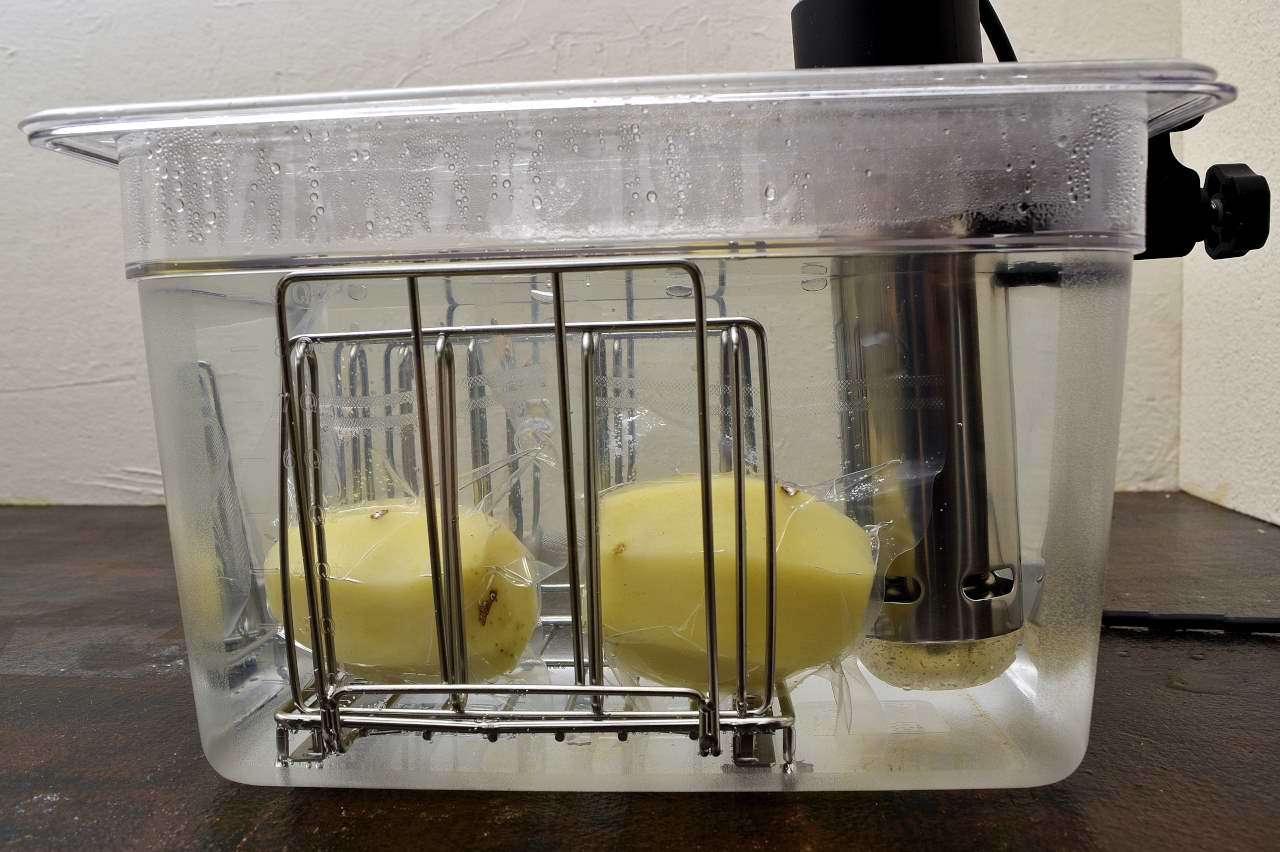 Mashed potatoes:
Mashed potatoes:
While the artichoke cooks, peel the potato, vacuum seal and process in the same bath as the artichoke at
183 F/84 C for 2 Hours
Remove the potato from the pouch and use a Kitchenaid type mixer and paddle attachment to break the potato up. Add butter, heavy cream, salt to taste, and mix until smooth. Add more cream if necessary to achieve desired thickness.
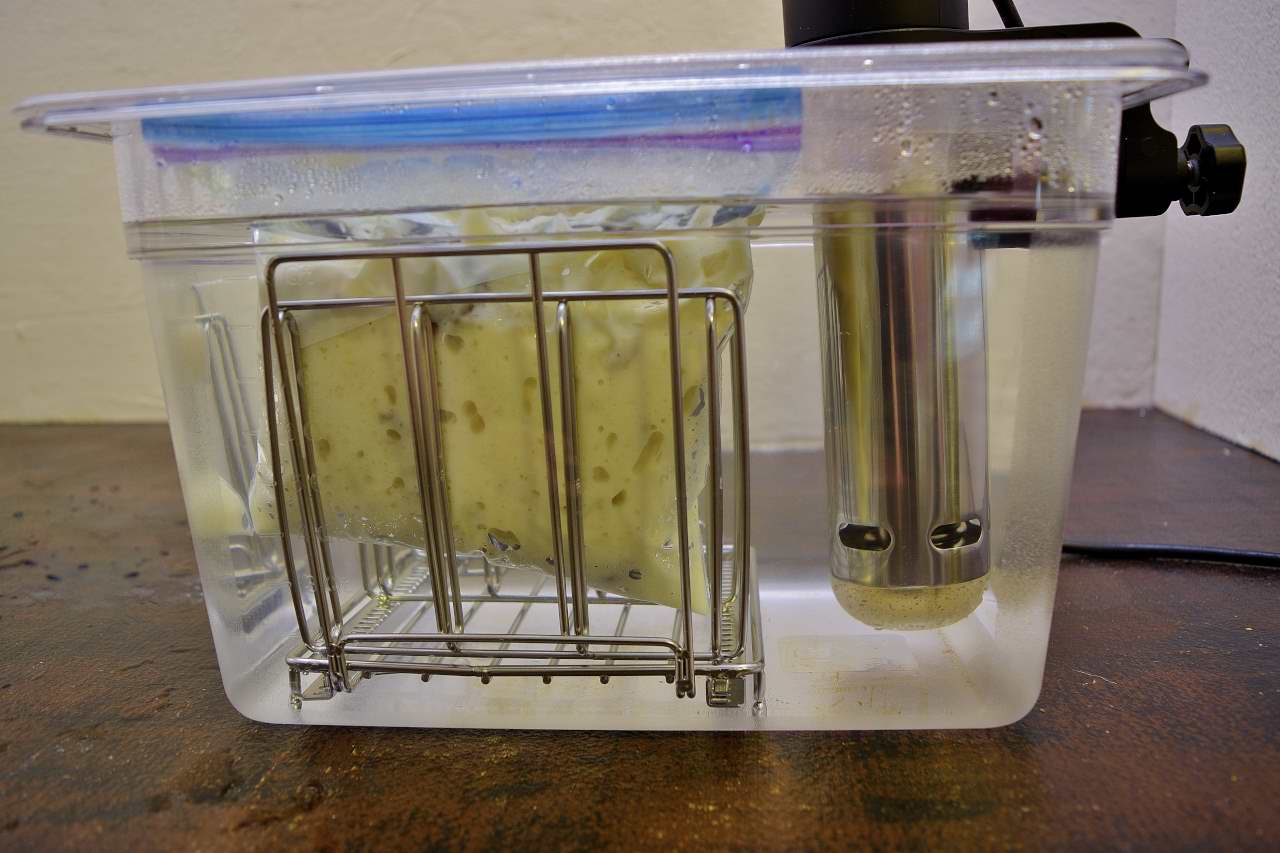 Return to plastic bag and hold in sous vide tank with the artichoke.
Return to plastic bag and hold in sous vide tank with the artichoke.
Make the sauce
While the artichoke and the potato are processing, cut the carrots, onions, and celery into 1″ /2.8 cm pieces. Heat a 12″/225 ml skillet to 275 F/135 C. Add 0.25 cup/50 ml vegetable oil to the pan. Spread the vegetables out in the pan so they all touch the bottom of the pan. This will make them brown evenly.

You should hear sizzling. If you hear hissing, turn the heat up. If you hear popping sounds, turn down. Do not stir excessively–allow the vegetables to brown on all sides–approximately 30 minutes. Add the canned tomato sauce.

Reduce heat and let the tomato sauce get brown as well. Stir periodically.

Check the bottom of the pan and you will see a crust beginning to form–approximately thirty minutes.

Add 1 qt/1 L water to completely cover the vegetables. Bring the sauce to a boil, reduce to simmer for 1-2 hours until the vegetables are fully cooked. Strain and set aside. Clean the pan and return to the stove.
Finish the artichoke
Carefully drain the water from the artichoke and discard. Allow to cool at room temperature for thirty minutes. Turn upside down and cut in half starting at the stem. Remove outer layers until you reach leaves that are tender all the way through. Cut in half again and use a spoon to remove the hairy choke. Set aside and continue to the next step.
Finish the sauce
Heat 1.5 oz./40 ml of vegetable oil in the skillet to
350 F/176 C. Turn heat OFF.
Carefully sprinkle 2 oz./60 g. flour over the hot oil and stir with a wooden spoon. Be careful not to get this on your skin, it is quite hot and sticky. On medium heat, add 2 cups/400 ml of the strained liquid to the roux and stir with a wooden spoon or wire whisk. It should begin to bubble and thicken immediately. Add 1 cup/200 ml of the liquid. Simmer for five minutes. It is difficult to represent thickness in photographs but this sauce should not be very thick–it should pool on a plate but cling to a spoon. If it seems too thin, dissolve one tablespoon of cornstarch in 0.5 cups/100 ml of cold water. Drizzle into the simmering sauce until it achieves the desired thickness. Add kosher salt to taste–approximately 2 teaspoons. Strain the sauce again if necessary. Keep warm. Clean the skillet and return it to the stove.
Wrapping the short ribs in bacon
Dip the bags of short ribs in hot tap water (120 F/49 C) for five minutes to melt the gel. Remove the ribs from the bags and collect the juices. Stage the ribs in the refrigerator until you are ready for them again. Save the juices for another recipe.
Use a sharp knife to remove the bone from the meat as shown. Cut the meat into 8 equal cubes.
Wrap each cube in bacon and secure with a bamboo skewer. Heat the skillet to 225 F/107 C and fry until the bacon is crisp on all sides. Add the artichoke hearts to the pan to heat.
Finishing touches
Place mashed potatoes in the middle of a plate and put a little bit of the sauce on them. Remove the picks from the meat and arrange as shown. Cover the meat lightly with sauce and place one piece of artichoke on top.
Short ribs have a very dense and unctuous texture, given the patience to convert all that collagen into gelatin. The resulting gelatinous texture has a sensational feel on the palate.
In concert with the bacon and the sauce, this is a mouthwatering and satisfying dish.
Norm King
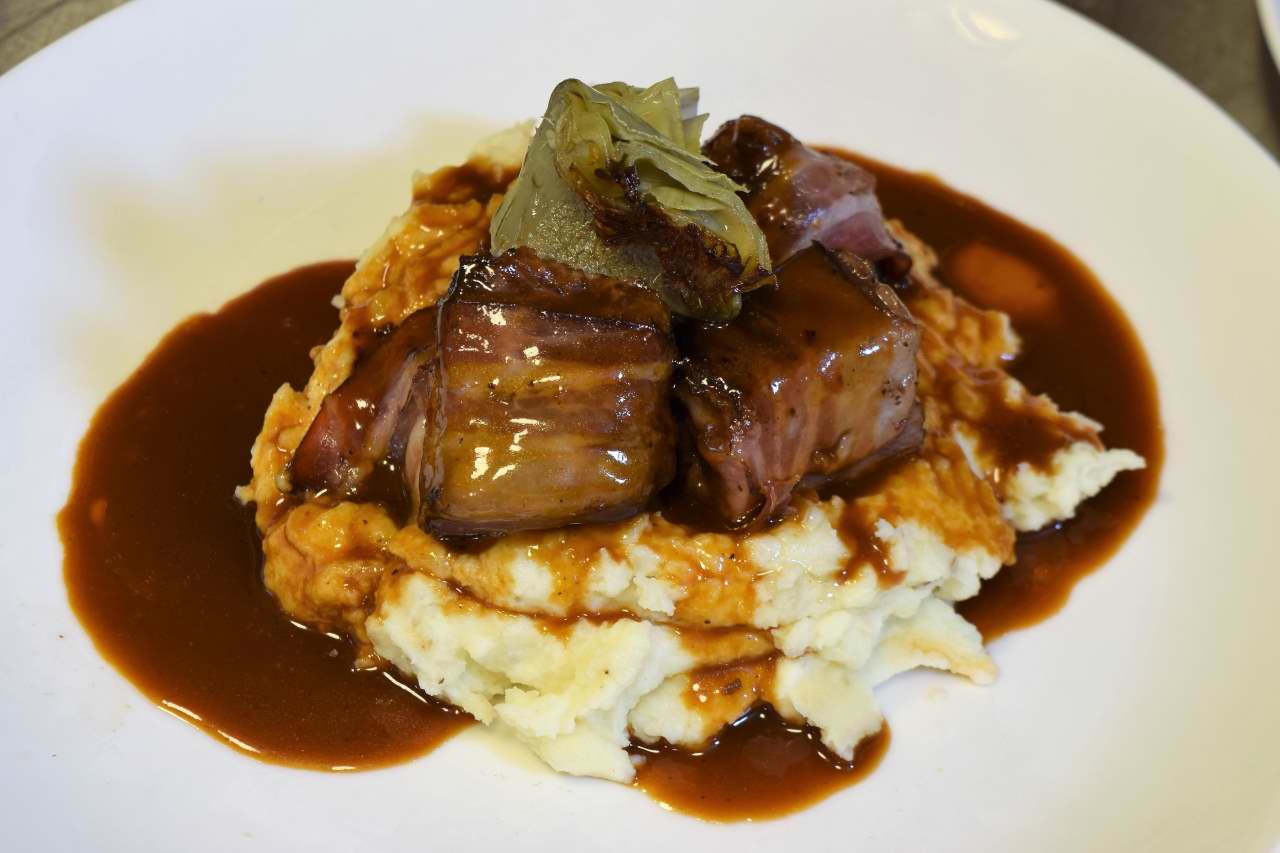


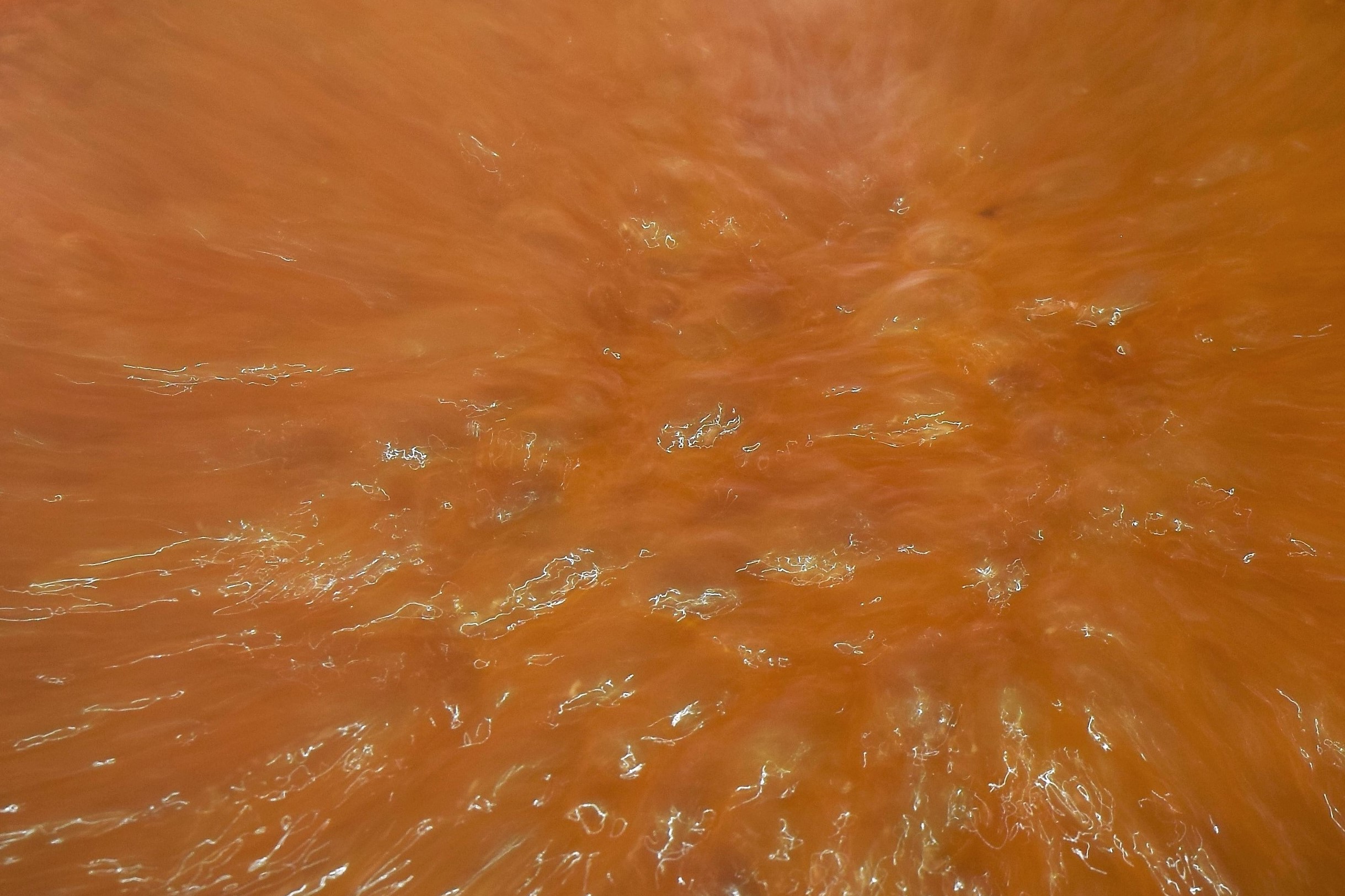
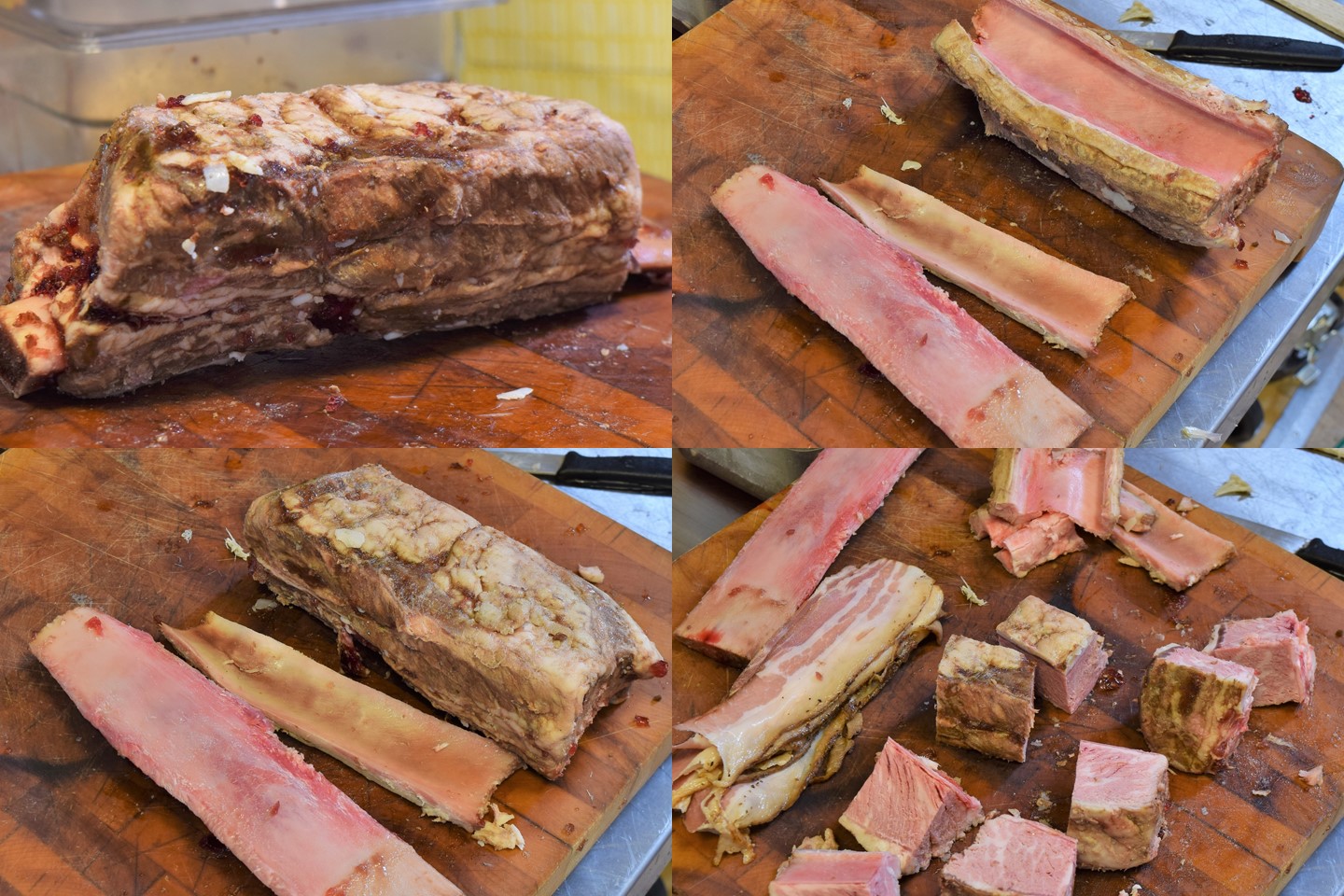




1